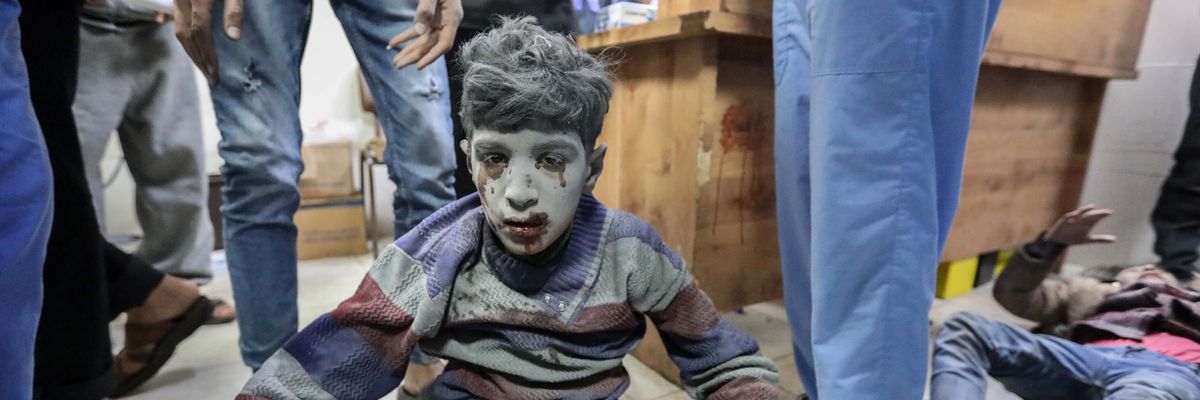Doctors treating wounded patients on the ground in Gaza and medical experts watching in horror from the outside pleaded with world leaders on Thursday to push for an immediate, sustained cease-fire as Israeli forces
continue to pummel the besieged Palestinian territory, leaving hospitals unable to cope with the rapid influx of airstrike victims.
Doctors Without Borders, known internationally as Médecins Sans Frontières (MSF),
said that for the first time since Israel's latest war on Gaza began in early October, the number of deceased people who were brought to the MSF-backed al-Aqsa Hospital on Wednesday "surpassed the number of injured people."
"The hospital is full, the morgue is full," MSF wrote on social media. "We call on Israeli forces to stop the indiscriminate bombing of the Gaza Strip and protect civilians and civilian infrastructure."
At the two-month mark of Israel's assault, Gaza's healthcare system is barely standing, with many hospitals damaged by airstrikes or forced to cease operations due to a lack of fuel, anesthesia, sanitation equipment, and other critical supplies. Israel's blockade has deprived the territory's medical facilities of electricity, forcing them to generators and—when those have run out of fuel—
phone lights.
"This war is raging because of a lack of political leadership. End the war on Gaza, and end it now."
Near-constant Israeli airstrikes and the lack of fuel caused by the blockade have forced ambulance services to
shut down in parts of Gaza, undermining emergency rescue efforts.
Hundreds of healthcare personnel are among the more than 16,000 people in Gaza who have been killed by Israeli forces since October 7, 90% of whom have been civilians, according to one
estimate. The United Nations has recorded more than 360 Israeli attacks on Gaza healthcare services.
Medical workers experiencing firsthand the devastating consequences of Israel's bombardment and siege have provided harrowing—and often sickening—accounts of the carnage.
(Warning: What follows is a graphic description of the scene at one hospital in southern Gaza.)
British war surgeon Tom Potokar, who is working for the International Committee of the Red Cross at the European Hospital in the embattled southern Gaza city of Khan Younis,
told The Independent that he has "seen far too many children whose lives have been destroyed." Israeli forces have stormed Khan Younis in recent days, imperiling displaced people in an area previously deemed a "safe zone."
"I've treated a four-month-old with significant burn injuries. I treated an eight-year-old that had an open fracture of his skull with an exposed brain," said Potokar. "It is just awful to see and it's so relentless. It's just not stopping, they keep coming in every day."
Addressing anyone who doubts the appalling images and accounts emerging from the strip by the minute, Potokar said that "if you could bring any person here who was not sure, and you place them here, and you got them to smell the stench of rotting flesh, to see the sight of maggots creeping from wounds of a person who has necrotic flesh and to hear the screams of kids because there's not enough analgesia, and they want their mum, who's not going to appear because she's dead—I think people might feel a bit different about this."
On Sunday, the World Health Organization's (WHO) executive board is set to hold a
rare emergency meeting on the spiraling healthcare crisis in Gaza, where infectious diseases such as Hepatitis A are beginning to spread in the territory's makeshift and badly overcrowded shelters for displaced people, who are struggling to survive without proper medical supplies and uncontaminated food and water.
"Gaza's health system is on its knees and near total collapse," WHO director-general Tedros Adhanom Ghebreyesus
said Wednesday. "We need peace for health."
Tlaleng Mofokeng, a physician from South Africa and the United Nations special rapporteur on the right to health, issued a scathing
statement Thursday accusing the Israeli military of waging an "unrelenting war" on Gaza's healthcare system and warning that "the practice of medicine is under attack."
"As a practicing medical doctor, I cannot fathom what my Gazan colleagues are enduring. They are working while their colleagues and loved ones are under attack. Many have been killed while treating their patients," said Mofokeng, who called for an immediate cease-fire. "We are in the darkest time for the right to health in our lifetimes."
"We bear witness to a shameful war on healthcare workers," she added. "This war is raging because of a lack of political leadership. End the war on Gaza, and end it now."

